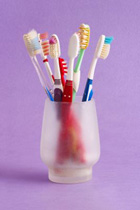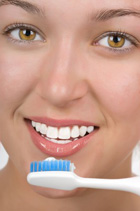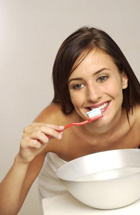 If you’ve just had an extraction in central Leeds of late, it’s very important that you take care of the wound afterwards, for many reasons, one of them being the development of a dry socket that can lead to further complications. Once a tooth is removed, a blood clot would normally form to aid the healing process, but if this does not happen, the surrounding bone and wound are vulnerable to infection and bacteria that can lead to the socket becoming dry. A normal extraction can take around 5 days to heal, longer in the case of teeth at the back of the mouth, but if dryness sets in, the pain can intensify around the removal site and expose the rest of the mouth to infection and gum disease, and also lead to problems in the ears and eyes. Hygiene is important in combating this problem. If the problem starts, it’s important to revisit the dentist for medication, and this may also require subsequent visits to combat the problem. Essentially, the wound should be kept clear- certain stodgy foods such as potatoes and nuts should be avoided during healing as they can lead to a build up of bacterial particles in the mouth. The use of a good mouthwash should be used after eating to remove any food left in the mouth and if the problem prevails, a dentist can prescribe drugs and recommend the use of herbal remedies such as clove and Echinacea oil.
If you’ve just had an extraction in central Leeds of late, it’s very important that you take care of the wound afterwards, for many reasons, one of them being the development of a dry socket that can lead to further complications. Once a tooth is removed, a blood clot would normally form to aid the healing process, but if this does not happen, the surrounding bone and wound are vulnerable to infection and bacteria that can lead to the socket becoming dry. A normal extraction can take around 5 days to heal, longer in the case of teeth at the back of the mouth, but if dryness sets in, the pain can intensify around the removal site and expose the rest of the mouth to infection and gum disease, and also lead to problems in the ears and eyes. Hygiene is important in combating this problem. If the problem starts, it’s important to revisit the dentist for medication, and this may also require subsequent visits to combat the problem. Essentially, the wound should be kept clear- certain stodgy foods such as potatoes and nuts should be avoided during healing as they can lead to a build up of bacterial particles in the mouth. The use of a good mouthwash should be used after eating to remove any food left in the mouth and if the problem prevails, a dentist can prescribe drugs and recommend the use of herbal remedies such as clove and Echinacea oil.





 It is important that tooth brushing, which ought to be protecting your teeth is not damaging them. This can happen if you are brushing too vigorously and you might want to choose a brush with softer bristles so that brushing doesn’t make your gums bleed and compromise your enamel.
It is important that tooth brushing, which ought to be protecting your teeth is not damaging them. This can happen if you are brushing too vigorously and you might want to choose a brush with softer bristles so that brushing doesn’t make your gums bleed and compromise your enamel. Maintaining your oral hygiene helps you to smile with confidence and avoid painful and unsightly conditions. To prevent a build-up of plaque bacteria, which can cause diseases in the mouth, a regular routine of brushing and flossing must be pursued. A healthy mouth means one that has teeth which are clean and free from debris, pink gums and an absence of bad breath.
Maintaining your oral hygiene helps you to smile with confidence and avoid painful and unsightly conditions. To prevent a build-up of plaque bacteria, which can cause diseases in the mouth, a regular routine of brushing and flossing must be pursued. A healthy mouth means one that has teeth which are clean and free from debris, pink gums and an absence of bad breath. It’s very easy to overlook dental hygiene and rely on the dentist to solve any complications when they arise and restore the health of the teeth again, according to a central Leeds dentist. But what happens in the mouth, can affect the rest of the body and any oral infections and disease can lead to very serious health issues. Bacteria are a constant danger to our teeth and if unchecked, can lead to dental caries (or cavities) and then pain, disease, tooth loss and infection- in some cases, death. Caries attack the tooth in three different ways. The first is on the top of the tooth where the enamel folds into crevasses and is the most difficult area to clean. If plaque is allowed to build up, the bacteria will slowly form cavities and these can be spotted visually. The second location is where the tooth reaches down to the gum (a white, chalky spot being a give away) and the third is the root- these can be detected by a radiograph and are more difficult to treat. The worst example is where cavities occur in a lot of teeth- rampant caries and children are at high risk to this, especially when new teeth are coming through. Common causes of caries are high sugar content foods and a bacteria promoting diet that leads to plaque and tartar, a dry mouth due to the lack of saliva (often due to the use of stimulants and/or smoking) and poor oral hygiene. If decay is detected, immediate treatment will be required. Depending on the extent of the problem, a filling is the most common solution. If the level of decay is bad, the tooth may require a root canal and in extreme cases, an extraction may be the only answer.
It’s very easy to overlook dental hygiene and rely on the dentist to solve any complications when they arise and restore the health of the teeth again, according to a central Leeds dentist. But what happens in the mouth, can affect the rest of the body and any oral infections and disease can lead to very serious health issues. Bacteria are a constant danger to our teeth and if unchecked, can lead to dental caries (or cavities) and then pain, disease, tooth loss and infection- in some cases, death. Caries attack the tooth in three different ways. The first is on the top of the tooth where the enamel folds into crevasses and is the most difficult area to clean. If plaque is allowed to build up, the bacteria will slowly form cavities and these can be spotted visually. The second location is where the tooth reaches down to the gum (a white, chalky spot being a give away) and the third is the root- these can be detected by a radiograph and are more difficult to treat. The worst example is where cavities occur in a lot of teeth- rampant caries and children are at high risk to this, especially when new teeth are coming through. Common causes of caries are high sugar content foods and a bacteria promoting diet that leads to plaque and tartar, a dry mouth due to the lack of saliva (often due to the use of stimulants and/or smoking) and poor oral hygiene. If decay is detected, immediate treatment will be required. Depending on the extent of the problem, a filling is the most common solution. If the level of decay is bad, the tooth may require a root canal and in extreme cases, an extraction may be the only answer. Infection control has taken on added significance these days because we live in times where diseases take very little time to spread from city to city and country to country. The fear of HIV/AIDS is always there, but there are now more communicable diseases that we have to watch out against. As a matter of fact, new diseases keep appearing and the medical profession has to do all it can to keep them at bay.
Infection control has taken on added significance these days because we live in times where diseases take very little time to spread from city to city and country to country. The fear of HIV/AIDS is always there, but there are now more communicable diseases that we have to watch out against. As a matter of fact, new diseases keep appearing and the medical profession has to do all it can to keep them at bay. People who have lost one or more teeth need to find a replacement at the earliest because an empty space in the jaw can attract a lot of trouble, in addition to looking really bad. It can cause other healthy teeth to shift towards it, thereby resulting in gaps between a few teeth. It will also give bacteria a good place to thrive.
People who have lost one or more teeth need to find a replacement at the earliest because an empty space in the jaw can attract a lot of trouble, in addition to looking really bad. It can cause other healthy teeth to shift towards it, thereby resulting in gaps between a few teeth. It will also give bacteria a good place to thrive. Halitosis is a condition that can make life really miserable for people who suffer from this condition. It is another term for bad breath and having this condition can make one a social outcast. It is mainly caused by the presence of bacteria in the mouth that are present there due to improper oral hygiene. The bacteria feed on the food particles that have not been cleaned away. Bad breath is also caused by bacteria in the stomach and it is also caused by blocked sinuses.
Halitosis is a condition that can make life really miserable for people who suffer from this condition. It is another term for bad breath and having this condition can make one a social outcast. It is mainly caused by the presence of bacteria in the mouth that are present there due to improper oral hygiene. The bacteria feed on the food particles that have not been cleaned away. Bad breath is also caused by bacteria in the stomach and it is also caused by blocked sinuses. A chipped tooth can be a source of immense problem to you if it is left untreated. Teeth are made of very hard material, but improper use can cause them to chip and crack. If you eat foods that are very hard, such as corn kernels or ice, one wrong bite can cause your tooth to chip. A popular Leeds dentist says that people have a tendency to ignore this problem as being very minor. However, in actuality it can easily escalate to a bigger problem.
A chipped tooth can be a source of immense problem to you if it is left untreated. Teeth are made of very hard material, but improper use can cause them to chip and crack. If you eat foods that are very hard, such as corn kernels or ice, one wrong bite can cause your tooth to chip. A popular Leeds dentist says that people have a tendency to ignore this problem as being very minor. However, in actuality it can easily escalate to a bigger problem. Acid production in the mouth is a major cause of bad breath, it isn’t the only cause but it is a good place to start, says a City ofl Leeds dentist. The worse time of the day is at night when you`re asleep, that’s when most damage is done to your teeth enamel from acid. The saliva gland stops working, and that allows your mouth to be used as an acid production factory by the bacteria that comes with your food. It is so important to clean your teeth, floss and rinse before going to bed; this will remove most of the food debris caught in between the teeth. The acid is produced by the bacteria feeding off the debris, with no saliva to neutralise it, it produces excessive amounts that then attacks the enamel. The acid also kills off the bacteria and this is then deposited onto the teeth as tartar, which is the hard, rough coating that your dentist will remove every 6 months on your check ups. Drinking water at night will also keep the acid at bay, then first thing in the morning rinse with a good mouth wash. If you do this as a regular regime, then bad breath will become a thing of the past and good riddance to it. During the day always give your teeth a quick flossing with a floss stick after every time you eat, and keep away from sugary drinks as they contain `food` in the form of sugar and fats for the bacteria to feed off.
Acid production in the mouth is a major cause of bad breath, it isn’t the only cause but it is a good place to start, says a City ofl Leeds dentist. The worse time of the day is at night when you`re asleep, that’s when most damage is done to your teeth enamel from acid. The saliva gland stops working, and that allows your mouth to be used as an acid production factory by the bacteria that comes with your food. It is so important to clean your teeth, floss and rinse before going to bed; this will remove most of the food debris caught in between the teeth. The acid is produced by the bacteria feeding off the debris, with no saliva to neutralise it, it produces excessive amounts that then attacks the enamel. The acid also kills off the bacteria and this is then deposited onto the teeth as tartar, which is the hard, rough coating that your dentist will remove every 6 months on your check ups. Drinking water at night will also keep the acid at bay, then first thing in the morning rinse with a good mouth wash. If you do this as a regular regime, then bad breath will become a thing of the past and good riddance to it. During the day always give your teeth a quick flossing with a floss stick after every time you eat, and keep away from sugary drinks as they contain `food` in the form of sugar and fats for the bacteria to feed off. It sounds like a medieval torture, but a root canal is a really painless and efficient way of freeing a tooth of infection. A Leeds Central dentist explains that a root canal is a very special way of saving a tooth that usually would have been lost. It all comes down to infections, which are usually caused by bad bacteria getting into the inner chamber of the tooth. This can be through infected gums or most likely a crack in the tooth itself, once in there the infection tends to keep coming back. Your dentist needs to get right to the centre of the problem, so they will start off with a little gel on the gums to deaden the sensation of the needle for the local anaesthetic. Then they will drill out the centre of the tooth and it will look like you have a hollow tooth, next will come some scraping of the infected area to get out the root of the bacteria build up. Next they will treat the area with an intense light that kills off any bacteria still lurking around. The hole is then filled in with a specially prepared filler, which contains not just a hard material to replace your enamel, but an anti bacterial formula to keep future infections away. The crack will also disappear and you will be able to use the tooth as soon as the soreness wears off in a few days, the important thing is that the tooth will be saved.
It sounds like a medieval torture, but a root canal is a really painless and efficient way of freeing a tooth of infection. A Leeds Central dentist explains that a root canal is a very special way of saving a tooth that usually would have been lost. It all comes down to infections, which are usually caused by bad bacteria getting into the inner chamber of the tooth. This can be through infected gums or most likely a crack in the tooth itself, once in there the infection tends to keep coming back. Your dentist needs to get right to the centre of the problem, so they will start off with a little gel on the gums to deaden the sensation of the needle for the local anaesthetic. Then they will drill out the centre of the tooth and it will look like you have a hollow tooth, next will come some scraping of the infected area to get out the root of the bacteria build up. Next they will treat the area with an intense light that kills off any bacteria still lurking around. The hole is then filled in with a specially prepared filler, which contains not just a hard material to replace your enamel, but an anti bacterial formula to keep future infections away. The crack will also disappear and you will be able to use the tooth as soon as the soreness wears off in a few days, the important thing is that the tooth will be saved.

